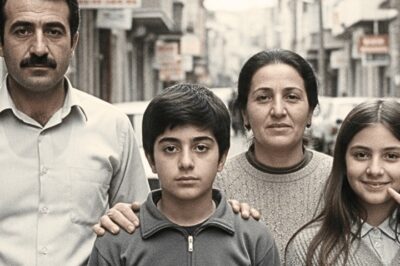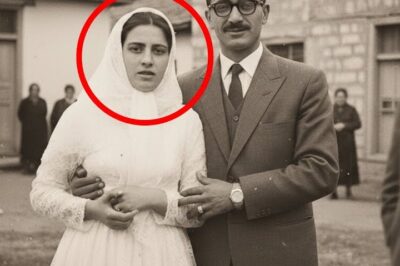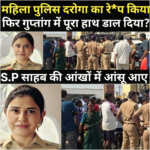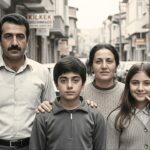Bihar Election Update: Voter’s List! EC’s big decision, what to do if you don’t have the document?
As Bihar heads toward its crucial elections, the political landscape is abuzz with debates and controversies surrounding the ongoing revision of the voter list—a process that has not only captured the attention of the state but has also reached the Supreme Court of India. At the heart of this debate lies a fundamental question: how do we define citizenship and eligibility in the world’s largest democracy, and can the state balance the need for electoral integrity with the imperative of inclusion?
The last comprehensive revision of India’s voter list took place in 2003, making the current exercise both overdue and significant. The Election Commission of India (ECI) asserts that this process is a constitutional and moral necessity, not only to uphold the sanctity of elections but also to ensure that the right to vote is exercised only by those who are genuinely eligible. The timing of this revision, coinciding with the Bihar elections, has made the state the focal point of a process that is expected to eventually sweep across the country.
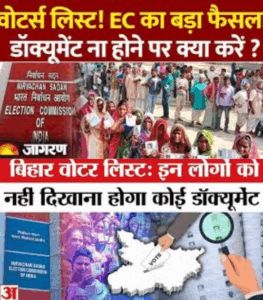
The ECI has outlined four primary reasons for this revision. First, the names of deceased individuals, who are still listed as voters, must be removed. Second, all those who have recently turned eighteen and thus become eligible to vote should be added to the list. Third, the process aims to identify and eliminate the names of illegal immigrants who may have found their way onto the voter rolls. Fourth, individuals who have migrated out of Bihar—whether to Delhi or elsewhere—and have changed their permanent address should also be removed from the state’s voter list. In essence, the revision is intended as a thorough vetting and filtering exercise, ensuring that only legitimate voters are retained.
On the surface, these reasons appear uncontroversial. After all, a clean and accurate voter list is essential for any democracy. Yet, the process has sparked significant controversy and opposition. Critics argue that the revision, while necessary in principle, is fraught with practical challenges and risks disenfranchising millions, especially among the poor and marginalized.
A major point of contention is the documentation required to prove citizenship and eligibility. Traditionally, voter IDs in India have been issued based on Aadhaar (the national biometric ID) and PAN (Permanent Account Number) cards. However, the ECI now contends that neither Aadhaar nor PAN alone is sufficient to establish citizenship. To address this, a new list of acceptable documents has been released, which includes passports, birth certificates, matriculation certificates, proof of permanent residence, government service identity cards, pension orders, caste certificates, and forest rights certificates. These documents are meant to establish not just identity, but also the place and date of birth—crucial factors in determining eligibility.
The opposition’s criticism centers on the accessibility of these documents for ordinary citizens, particularly the elderly, rural residents, and the uneducated. For instance, many elderly women in Bihar’s villages—such as grandmothers born before independence—are unlikely to possess a passport, a birth certificate, or even a matriculation certificate. In such cases, critics argue, the process risks excluding genuine citizens from the electoral rolls simply because they lack the prescribed paperwork.
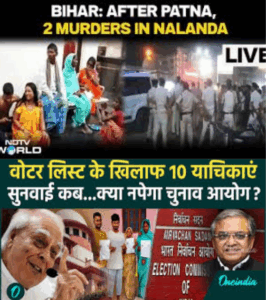
The scale of the task adds another layer of complexity. Bihar has approximately 75 million registered voters, of which about 50 million are listed in the 2003 rolls. The remaining 20 million or so are either new voters or need to be added due to demographic changes. The ECI has appointed around 70,000 booth officers to carry out the verification and revision process. The question, however, is whether this workforce is sufficient to scrutinize the records of 75 million people in a span of just two and a half to three months. Concerns abound that such a massive and hurried exercise could lead to errors, lapses, and even manipulation.
The process is further complicated by the fact that, for those born before 1987, inclusion in the 2003 voter list serves as the primary basis for renewal. If a person’s name appears in the 2003 list, the process is relatively straightforward; they simply need to renew their registration. However, for those born between 1987 and 2004, at least one document from the new list is required, along with proof of citizenship of either parent. For individuals born after 2004, both parents’ citizenship proofs must be submitted. This multi-layered documentation requirement, critics argue, disproportionately affects the poor, the uneducated, and those living in remote areas.
The Supreme Court’s involvement underscores the gravity of the issue. A public interest litigation (PIL) has been filed, and the court is set to hear arguments from both sides. The outcome of this hearing, scheduled for July 10, is eagerly awaited, as it will determine whether the process will proceed as planned or if modifications will be mandated to safeguard the rights of vulnerable groups.
The opposition’s apprehensions are not entirely unfounded. In a state where millions still struggle with basic literacy and access to government services, the introduction of a complex documentation regime can have far-reaching consequences. The risk is that those who are least equipped to navigate bureaucratic hurdles—rural women, the elderly, landless laborers—may find themselves disenfranchised, further deepening existing social and economic inequalities.
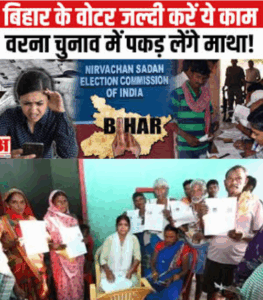
Proponents of the revision argue that the integrity of the electoral process is paramount. They point to the need to prevent illegal immigrants from influencing elections and to remove the names of deceased or absent individuals from the rolls. They also emphasize that booth officers have been given discretionary powers to verify citizenship through local inquiries, which could mitigate some of the challenges faced by those without documents. Yet, this very discretion raises concerns about arbitrariness, bias, and the potential for abuse.
The debate also highlights a broader tension in Indian democracy: the balance between technological modernization and social inclusion. While digital IDs like Aadhaar have streamlined many government services, they are not foolproof, and their use as the sole basis for voter eligibility has been deemed insufficient by the ECI. The new rules, while aiming for greater rigor, risk leaving behind those who are unable to produce the required paperwork due to circumstances beyond their control.
The government and the ECI maintain that the process is necessary and that adequate safeguards are in place. They argue that the revision will ultimately strengthen democracy by ensuring that only bona fide citizens are allowed to vote. However, as the process unfolds, it is clear that the stakes are high—not just for the immediate outcome of the Bihar elections, but for the credibility of India’s democratic institutions as a whole.
The coming weeks will be critical. As the Supreme Court deliberates, and as booth officers fan out across Bihar to verify millions of records, the state will serve as a test case for the rest of the country. The challenge is immense: to clean up the voter rolls without excluding the marginalized, to uphold the integrity of the process without sacrificing compassion and fairness.
Ultimately, the Bihar voter list revision is more than an administrative exercise—it is a reflection of India’s ongoing struggle to build a democracy that is both robust and inclusive. The outcome will not only shape the future of elections in Bihar but will also set a precedent for how the world’s largest democracy defines citizenship, exercises state power, and protects the rights of its most vulnerable citizens. As the process moves forward, it is essential that the voices of those at risk of exclusion are heard, and that the promise of democracy is kept alive for every Indian, regardless of their circumstances.
Play video :
News
Mafya Patronunun Bebeği Dokunulduğunda Durmadan Ağlıyordu — Ta ki Bir Hemşire Akıl almaz Olanı Yapan
Mafya Patronunun Bebeği Dokunulduğunda Durmadan Ağlıyordu — Ta ki Bir Hemşire Akıl almaz Olanı Yapan . Mafya Patronunun Bebeği Dokunulduğunda…
Harp Okulu Skandalı Sınırdaki Yolsuzluk Çetesini Kadın General Bitirdi
Harp Okulu Skandalı Sınırdaki Yolsuzluk Çetesini Kadın General Bitirdi . . . Harp Okulu Skandalı: Sınırdaki Yolsuzluk Çetesini Bitiren Kadın…
Mart 1982’de Ankara’da bir aile iz bırakmadan kayboldu. 25 yıl sonra bulunan günlük her şeyi değişti
Mart 1982’de Ankara’da bir aile iz bırakmadan kayboldu. 25 yıl sonra bulunan günlük her şeyi değişti . . . Mart…
Bu Düğün Fotoğrafına Dikkatli Bakın: Koca Gelinin Kolunu Neden Bu Kadar Acımasızca Tutuyor?
Bu Düğün Fotoğrafına Dikkatli Bakın: Koca Gelinin Kolunu Neden Bu Kadar Acımasızca Tutuyor? . . . Bu Düğün Fotoğrafına Dikkatli…
KÖR BİR KADIN, KİBİRLİ BİR MİLYONERİ SANAL SEVGİLİSİYLE KARIŞTIRIR… VE O ARTIK ASLA AYNI OLMAZ!
KÖR BİR KADIN, KİBİRLİ BİR MİLYONERİ SANAL SEVGİLİSİYLE KARIŞTIRIR… VE O ARTIK ASLA AYNI OLMAZ! . . Kör Bir Kadın,…
MILYONARYA NAGBIHIS MAHIRAP PARA MAHANAP ANG TUNAY NA PAG-IBIG, NAMUTLA SYA NANG MAKILALA ANG..
MILYONARYA NAGBIHIS MAHIRAP PARA MAHANAP ANG TUNAY NA PAG-IBIG, NAMUTLA SYA NANG MAKILALA ANG.. . . . MILYONARYA NAGBIHIS MAHIRAP…
End of content
No more pages to load



